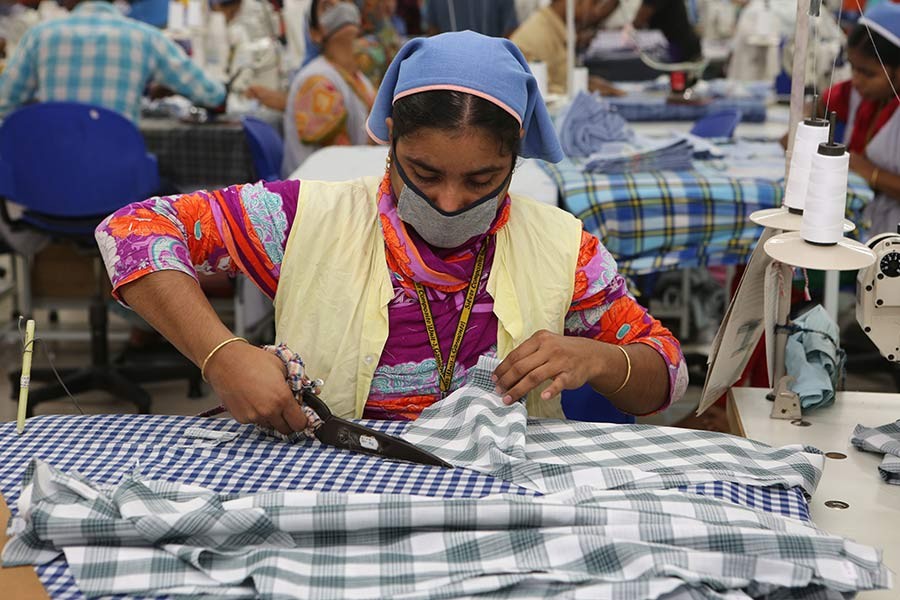In Bangladesh, the last revision of minimum wage for garment workers (from Tk 3,000 in 2010 to Tk 5,300 in 2014) was marked by a 37 per cent increase. In that backdrop, how much increase should the workers expect with regard to the minimum wage?
The minimum wage board is now working on a new minimum pay structure for the workers of the ready-made garment industry (RMG). The RMG workers' associations are demanding Tk 16,000 as minimum wage, citing rise in cost of living and inflation. Already, many industry insiders have opined that with an increase in wage, Bangladesh will no longer remain cost-effective in terms of wages. It is quite significant that the owners of garment factories voluntarily took up the matter of fixing minimum wages for their workers. But how far are they ready to raise the minimum wage?
There is a reality that must be taken into consideration, otherwise the interests of both the workers and owners will be in jeopardy. Hundreds of factories have already been closed due to various reasons like Accord and Alliance inspection, rise in production cost, high compliance cost and low price of products.
Representative bodies of the garment factory-owners have recently proposed raising the minimum wage by 20 per cent to Tk 6,360. But between 2013 and 2018, the prices of essentials (food, housing, healthcare, children's education and recreation) have considerably gone up, which has reduced the purchasing power of RMG workers.
The inflation rate is yet to come down to the desired level, as the average inflation rate was 5.81 per cent from June 2017 to May 2018, according to BBS (Bangladesh Bureau of Statistics) data. The economists have opined that the revised minimum wage rate should not only compensate for inflation, but should also raise workers' purchasing power.
A convenient principle in setting the minimum wage rate could be to increase the wage rate by the same percentage as the growth in national income. The per capita real GDP (gross domestic product) and the per capita real GNP (gross national product) grew by 31 per cent and 27 per cent respectively from 2013 to 2018, as per the latest national accounts statistics of the BBS. The country is also expected to reach middle-income country status by 2024.
It is true that the garment industry of Bangladesh is going through a transition after the Rana Plaza tragedy, and the cost of compliance has risen to a large extent. An excessive increase in the minimum wage could put extra pressure on the owners and businesses. Therefore, the minimum wage board should consider all these possibilities before finalising the rate. It is pertinent to note that around 4.4 million workers, mostly women, are employed in more than 4,500 industries in Bangladesh.
There is another problem here. When the minimum salary for a government employee is Tk 15,250, how can a garment worker make do with one-third of that amount, especially when both purchase their essentials from the same market?
However, Accord and Alliance, two RMG buyers' associations from Europe and Americas, have played a pivotal role in raising the safety standard of the country's garment factories. Now they should equally stand by the side of workers here.
According to the statement of RMG entrepreneurs, the buyers purchase goods from different countries with different price tags. But in Bangladesh, they attempt to buy the same goods with lower prices compared to other countries. Lower prices of products are a hindrance to increasing the wages of workers.
When a product is sold, it is the buyers who get the larger share of profit. If they agree to increase the price of a garment product by just a cent, it can be enough to raise the minimum wage for a worker in Bangladesh to a reasonable level. The government should undertake negotiations, lobbying and advocacies with the European Union (EU), USA and other related multilateral and bilateral parties. Besides, the government can help the garment industry by providing cash incentives, lower interest rates in case of bank loans and easy access to finance which, in turn, facilitate fixing fair minimum wages for the garment workers.
Md. Harunur Rashid is Deputy Secretary of the Bangladesh Knitwear Manufacturers and Exporters Association (BKMEA).


